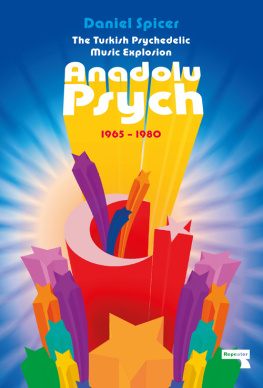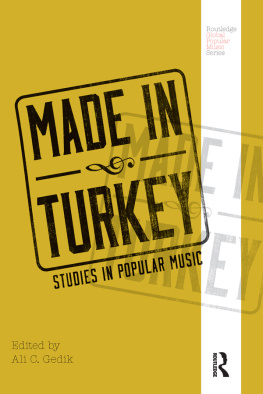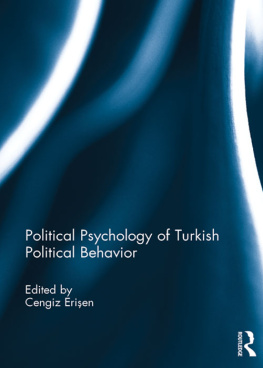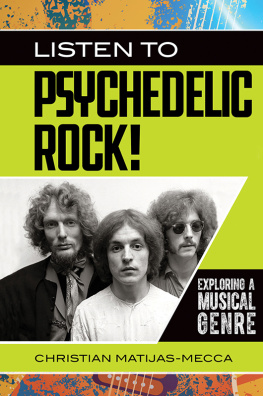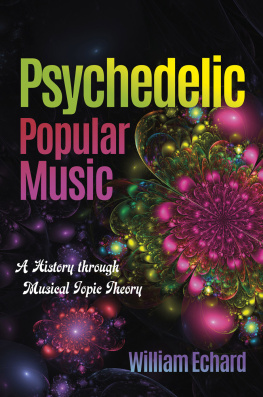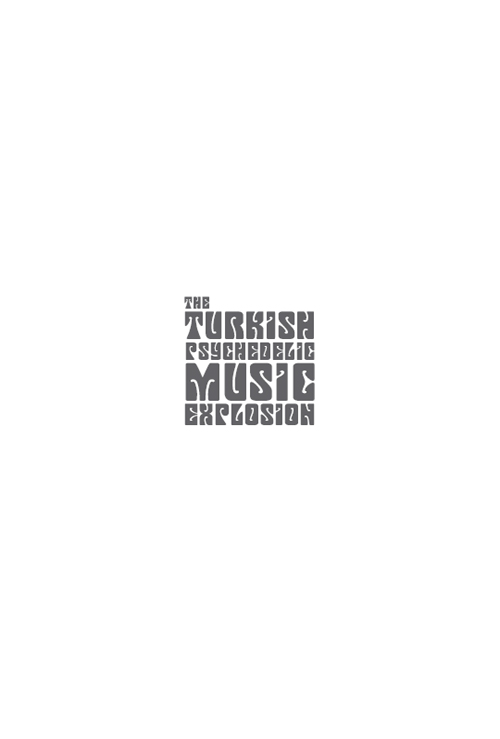

Contents
PREFACE
Back in the autumn of 2011, I was approached by The Wire magazine with a commission to write a feature on Turkish psychedelic music of the 1970s. It was to be the kind of article the magazines editorial team refer to as a primer an introduction and overview based around a selection of key recordings of my choice. Being a dedicated freelance professional with an expensive record-buying habit to fund, I agreed to write it, of course. But I didnt mention the fact that it was a subject I knew practically nothing about. In truth, Id never really heard anything about a Turkish psych scene. So, I began to dig around on the internet to see what I could uncover.
I could barely believe my ears. The music I discovered was a major revelation, and spoke to me in a powerful way. Here was a whole world of hitherto uncharted sounds that blended several of my abiding musical passions: psychedelia, progressive rock, funk and folk with distant echoes of Indian raga and weird, non-Western tunings. It reminded me of a dream Id had as a teenaged comic book fanatic, in which I found an old-fashioned wooden chest that turned out to be full of superhero titles Id never even heard of. In fact, as I researched the artists responsible for making these incredible sounds, I began to realise I had indeed found my unknown superheroes: amazing, larger-than-lfe characters parading improbable fashions, impressive moustaches and hairstyles to die for.
It also quickly became apparent to me that there was a very real lack of information available on the subject in the English language. I had to dig hard. And that only added to the sense of this as elusive and tantalising arcana, a forgotten entry in the annals of global counterculture, a rich social history just out of reach. I soon understood that this was a story crying out to be told. This book represents my attempt to tell that story, and an opportunity to correct a few factual errors that, due to a scarcity of reference materials, regrettably found their way into my original feature. However, this doesnt aim to to be a definitive history. Aficionados of the scene (and, believe me, they quickly made themselves known to me with corrections and clarifications) may find that their favourite artist hasnt been covered. Theres no Hsn zkartal Orkestras in these pages. Mid-60s beat group Mavi Iklar does not appear here. Influential singer-songwriter Fikret Kzloks story will have to be told another day. Rather, I offer an expansion of my initial primer an introduction that, I hope, will nurture in the reader the same passion and curiosity that this incredible music has engendered in me.
Finally, theres one more reason why this tale deserves to be told now. At the beginning of the 21st century, were experiencing the full flowering of the apocryphal Chinese curse May you live in interesting times. Trump, Brexit and Turkeys own President Erdoan are gross manifestations of the disorientating, often worrying and downright confusing era in which we find ourselves. Yet, as the equally turbulent story of Anadolu Psych shows, interesting times call for interesting personalities. We should always have room for more heroes in our lives.
NEW SOUNDS FOR A NEW SOCIETY
The Bosphorus straits bisect the city like an elemental wound. Huge industrial ships and pleasure boats churn and whiten the dark blue waters. Minarets pierce the thick mist on the surrounding hills, sharp needles scratching the sky. To the east, huge, incalculable distances run off flatly into the body of Asia, fed by tarmac arteries. Arriving in Istanbul by car over the Bosphorus Bridge, its easy to understand how, for centuries, the city served as a teeming omphalos of world culture; the centre of a deep, human vortex where civilisations collided and merged; a disorientating kaleidoscope of East and West, North and South, ancient and modern. This was Constantinople, capital of the Ottoman world. For six hundred years, from the end of the 13th century, the Ottoman Empire was a global super-power, stretching, at its height in the late 1600s, from the Danube to the Nile, a vast and powerful Muslim land knocking at the doors of Christian Europe, its opulent magnificence ruled over by the Sultan, absolute monarch, answerable only to God.
Yet, by the first decades of the 20th century, this proud Ottoman identity was on shaky ground. Riddled with corruption and ennui, the Empire had been in continual decline since the second half of the 18th century. At the same time, nationalist sentiments had been growing among its many subject peoples, not least the Kurds, leading to an increase in ethnic tension and outbursts of violence. In 1918, defeat at the hands of the Allied Powers in the First World War dealt a blow from which the Ottoman world would never recover. The Empire finally collapsed, exhausted and dissolute, in November 1922, when the Turkish Parliament overthrew Sultan Mehmed VI and officially abolished the Sultanate, effectively ending 623 years of monarchical Ottoman rule. The following year, the new Republic of Turkey emerged as a hopeful phoenix, led by the distinguished military commander, and the Republics first President, Mustafa Kemal thereafter granted the honorific last name Atatrk (literally, Father of the Turks).
Atatrk immediately embarked on a programme of sweeping modernisation. For centuries, with one foot in the Mediterranean and one in Asia Minor, Turkey had served as a cultural bridge between Europe and the Middle East, leaving the Ottoman people uniquely positioned to retain an essentially Muslim identity while simultaneously absorbing Western influences. Now Atatrks reforms enhanced the Republics separation from the Muslim world, branding Turkey a secular state with liberal social attitudes, where the Roman alphabet and Western clothing and fashions were enthusiastically embraced. At the same time, Ankara became the Republics new capital and, not long after, ancient Constantinople was officially given its Turkish name, becoming modern Istanbul. Atatrks chief ideologist, Ziya Gkalp, set forth much of this thinking in his treatise The Principles of Turkism, published in 1923, in which he outlined the desire to turn away from Turkeys Ottoman past and Arab neighbours and build a West-facing Turkish identity. Moreover, music played a major part in this national rebranding exercise. Gkalp understood that the modern Turkey needed to discard Islamic-Ottoman music and connect with a truly Turkish art.
In the first instance, this meant a concerted break with the tradition of classical Turkish music (klasik Trk mzii), also known as Turkish art music (Trk sanat mzii). Originating around the 14th century, at the height of the Ottoman Empire, classical Turkish music was initially performed in the palaces, mosques and Sufi lodges of Constantinople and other major cities and was intimately entwined with Islamic thought. Compositions were based on a complex series of modes called makams, each of which, in Sufi teaching, was said to represent and convey a specific spiritual and psychological state. Even so, regardless of the particular makam being used, classical Turkish music was generally slow, stately and suffused with a sense of lingering, otherworldly melancholy. Primarily a vocal music, performances traditionally featured a singer pouring out heart-rending tales of love and loss, accompanied by a small instrumental ensemble traditionally a quartet of ney (end-blown flute), kemene (pear-shaped, bowed fiddle), kudm (hand drum) and
Next page
